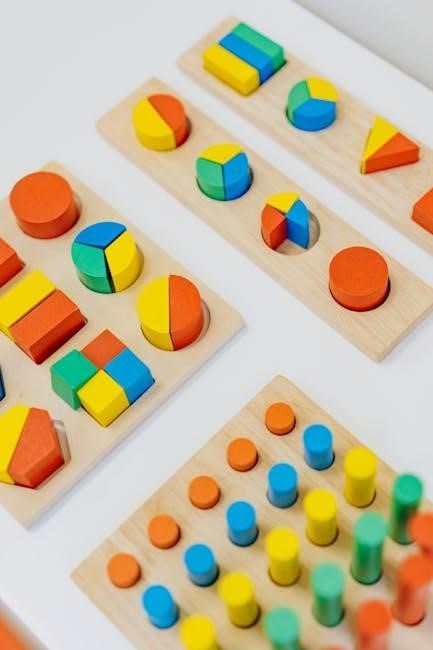
Overview of Saxon Math 8/7 Curriculum
Saxon Math 8/7 is a comprehensive curriculum designed for pre-algebra preparation. It emphasizes incremental learning, focusing on problem-solving and critical thinking through structured lessons and practice exercises. The program integrates money concepts, arithmetic operations, and essential math skills, preparing students for advanced studies. Its unique approach avoids memorization, instead fostering deep understanding and mastery of mathematical principles. The curriculum is supported by detailed teaching guides, intervention strategies, and additional resources like solution manuals and practice materials, ensuring a well-rounded educational experience.
1.1 Key Features and Philosophy
Saxon Math 8/7 emphasizes incremental learning, focusing on problem-solving and critical thinking. Its philosophy avoids memorization, instead building a strong foundation through understanding. The curriculum integrates money concepts and arithmetic operations, blending practical skills with theoretical knowledge. Teaching guides and intervention strategies support educators, while practice exercises and tests ensure mastery. This approach fosters a deep, lasting grasp of mathematical principles, preparing students for advanced studies.
1.2 Importance of Incremental Learning
Incremental learning in Saxon Math 8/7 ensures a solid foundation by introducing concepts gradually. Each lesson builds on previous knowledge, reinforcing skills and reducing learning gaps. This method promotes long-term retention and confidence, as students master one idea before moving to the next. It avoids overwhelming learners, fostering a steady progression that prepares them for more complex mathematics and real-world problem-solving scenarios.

Structure of Saxon Math 8/7
Saxon Math 8/7 features a structured approach with daily lessons, warm-up exercises, and practice sections. Each component is designed to reinforce skills incrementally, ensuring steady progress and mastery;
2.1 Lessons and Warm-Up Exercises
Saxon Math 8/7 organizes learning into structured lessons with warm-up exercises. Each lesson begins with a warm-up to review prior concepts, ensuring retention. New material is introduced incrementally, with clear explanations and examples. The exercises are designed to build confidence and fluency, preparing students for the practice sections that follow. This format reinforces foundational skills daily, promoting steady progress.
2.2 Practice and Facts Practice Sections
The Practice and Facts Practice sections in Saxon Math 8/7 reinforce new and previously learned concepts. These exercises focus on problem-solving and skill mastery, ensuring students build a strong foundation. Facts Practice emphasizes quick recall of multiplication facts, essential for pre-algebra success. Each problem set is carefully designed to promote understanding and fluency, preparing students for the challenges ahead in mathematics.

Saxon Math 8/7 Tests and Worksheets
Saxon Math 8/7 includes regular tests and worksheets to assess understanding and reinforce skills. These resources help identify areas needing review while ensuring mastery of concepts through structured practice.
3.1 Types of Assessments and Their Purposes
Saxon Math 8/7 includes tests, worksheets, and practice exercises to evaluate student progress. Tests measure understanding of lessons, while worksheets reinforce daily skills. The Multiplication Mastery Test assesses readiness for the course, ensuring foundational knowledge. These assessments help identify strengths, target areas for review, and track improvement, providing a clear path for student growth and mastery of mathematical concepts.
3.2 Strategies for Mastering Tests
To excel in Saxon Math 8/7 tests, students should regularly practice problem-solving and review past mistakes. Consistent use of teaching guides and solution manuals helps clarify concepts. Breaking down complex problems into smaller steps and managing time effectively during assessments are key. Additionally, mastering multiplication facts and practicing estimation techniques can significantly improve test performance and overall math proficiency.

Teaching Guide and Intervention Strategies
The Saxon Math 8/7 Teaching Guide provides detailed lesson plans and intervention techniques. It offers pre-algebra support and resources to address individual student needs effectively, ensuring comprehension and progress.
4.1 Role of the Teaching Guide in Lesson Planning
The Teaching Guide for Saxon Math 8/7 plays a pivotal role in lesson planning by offering detailed instructions, sample questions, and pacing advice. It helps educators structure daily lessons effectively, ensuring alignment with curriculum goals. The guide includes tips for introducing concepts, conducting discussions, and assigning practice exercises, making it an indispensable tool for teachers to deliver comprehensive math instruction tailored to student needs.
4.2 Pre-Algebra Intervention Techniques
The Saxon Math 8/7 curriculum incorporates targeted pre-algebra intervention strategies to address learning gaps. These techniques include additional practice exercises, step-by-step problem-solving guidance, and diagnostic assessments to identify areas needing review. The Teaching Guide provides specific interventions, such as using manipulatives or visual aids, to reinforce concepts and ensure students grasp foundational skills before progressing to more complex topics, fostering a strong pre-algebra foundation.

Problem-Solving and Critical Thinking
Saxon Math 8/7 enhances problem-solving skills through sequence problems, number patterns, and measuring angles with protractors, fostering critical thinking and mathematical reasoning in students.
5.1 Sequence Problems and Number Patterns
Saxon Math 8/7 incorporates sequence problems and number patterns to enhance problem-solving skills. Students learn to identify relationships and predict outcomes, reinforcing mathematical reasoning. These exercises, often involving arithmetic and geometric sequences, help build foundational skills for algebra. The curriculum includes visual aids and real-world applications, making abstract concepts accessible and engaging for learners at various skill levels.
5.2 Measuring Angles with Protractors
Saxon Math 8/7 teaches students to measure angles accurately using protractors, a foundational skill for geometry. Lessons integrate hands-on activities to understand angle measurement, aligning with geometry standards. Students learn to identify acute, obtuse, and right angles, developing spatial reasoning; Visual aids and step-by-step instructions ensure clarity, while problem-solving exercises apply these skills to real-world scenarios, fostering confidence in geometric concepts and their practical applications.

Resources and Supplements
Saxon Math 8/7 offers a Homeschool Packet and Solution Manuals for comprehensive support. Additional practice materials and guides provide enrichment, ensuring students master concepts and teachers are well-equipped for instruction.
6.1 Homeschool Packet and Solution Manuals
The Saxon Math 8/7 Homeschool Packet includes detailed lesson plans, teaching guides, and student worksheets. Solution Manuals provide answers to all problems, enabling parents to track progress effectively. These resources ensure comprehensive understanding and facilitate independent learning. The structured format aligns with the curriculum, offering a seamless educational experience for homeschoolers. Additional practice materials are also available for reinforcement.
6.2 Additional Practice Materials
Additional practice materials for Saxon Math 8/7 include worksheets, tests, and online resources. These materials reinforce lesson concepts, ensuring mastery of arithmetic operations, money handling, and pre-algebra skills. They offer varied exercises to cater to different learning styles, fostering critical thinking and problem-solving abilities. The structured format aligns with the curriculum, providing comprehensive practice and reinforcing understanding of key mathematical principles. These resources are invaluable for both classroom and homeschool settings.

Mastery of Multiplication and Readiness
Mastery of multiplication is crucial for success in Saxon Math 8/7. Students must demonstrate readiness by completing a Multiplication Mastery Test within five minutes to ensure preparedness.
7.1 Importance of Multiplication Mastery
Multiplication mastery is foundational for algebra and higher math. It enhances problem-solving and critical thinking, key focuses of Saxon Math 8/7. The curriculum’s structured approach ensures students build this skill incrementally, avoiding gaps in understanding. Proficiency in multiplication is assessed through specific tests, ensuring readiness for more complex concepts. This skill is essential for long-term math success and academic confidence.
7.2 Assessing Student Readiness
Assessing student readiness is crucial for a smooth transition into Saxon Math 8/7. The curriculum recommends using the Multiplication Mastery Test to evaluate a student’s foundational skills. If a student can complete this test in five minutes, they are deemed ready. If not, intervention strategies and additional practice are suggested to ensure a strong grasp of essential concepts before progressing, aligning with the program’s incremental learning approach.

Lesson-Specific Content
Lesson 29 focuses on rounding whole numbers and estimating, while Lesson 1 introduces whole numbers and their basic operations. These lessons build foundational math skills systematically.
8.1 Lesson 29: Rounding and Estimating
Lesson 29 in Saxon Math 8/7 focuses on rounding whole numbers and mixed numbers, as well as estimating answers. Students practice rounding to the nearest ten, hundred, and thousand, while learning to estimate sums and differences. Warm-up exercises reinforce facts practice, and the lesson includes structured activities to develop number sense and real-world application of rounding skills.
Lesson 1 introduces students to whole numbers, defining them as numbers without fractions or decimals. It explores their importance in basic arithmetic, including counting, ordering, and simple operations. Activities focus on identifying and writing whole numbers, understanding place value, and applying these concepts to real-world scenarios, building a strong foundation for future math skills.

Money and Arithmetic Operations
The curriculum integrates money concepts and arithmetic skills, teaching practical applications like budgeting and change calculation. It builds foundational math abilities through real-world examples and exercises;
9.1 Integrating Money Concepts
The curriculum seamlessly integrates money concepts, teaching students to count money, make change, and understand budgeting basics. Lessons incorporate real-world applications, connecting money management to arithmetic skills. This approach ensures practical math proficiency, preparing students for everyday financial tasks while reinforcing core mathematical principles through engaging exercises and problem-solving scenarios involving currency and transactions.
9.2 Developing Arithmetic Skills
Saxon Math 8/7 focuses on building strong arithmetic foundations through structured lessons and practice exercises. Students master essential operations like addition, subtraction, multiplication, and division, applying them to real-world problems. The curriculum emphasizes problem-solving and critical thinking, ensuring a deep understanding of numerical relationships. This approach fosters accuracy, speed, and confidence, preparing students for more complex math concepts in algebra and beyond.
Saxon Math 8/7 equips students with a solid foundation for advanced math studies, fostering problem-solving skills and arithmetic mastery. This curriculum prepares learners for algebra and beyond, ensuring lifelong math proficiency and confidence in tackling complex concepts.
10.1 Progression Beyond Saxon Math 8/7
After mastering Saxon Math 8/7, students are well-prepared for algebra and higher-level mathematics. The curriculum’s focus on problem-solving and arithmetic mastery ensures a smooth transition to more complex concepts. Learners develop critical thinking skills and a strong foundation, enabling them to approach advanced math with confidence and readiness for future academic challenges.
10.2 Lifelong Math Skills Development
Saxon Math 8/7 fosters lifelong math skills by emphasizing problem-solving, critical thinking, and practical application. Its incremental approach ensures mastery of foundational concepts, enabling students to approach complex problems with confidence. The curriculum’s focus on arithmetic and pre-algebra prepares learners for long-term academic success and real-world applications, fostering a strong mathematical foundation that supports future learning and skill development.